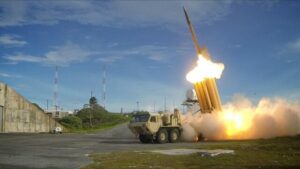The United States has announced the deployment of the advanced Terminal High Altitude Area Defense THAAD missile defense system to Israel, accompanied by about 100 U.S. troops. This action is part of efforts to bolster Israel’s defense capabilities amid growing tensions and threats from Iran and pro-Iranian forces in the region.
The advanced anti-missile system the U.S. is sending to Israel will bolster Israel’s air defenses by targeting the type of missiles Iran commonly uses, military analyst Michael Holmes told CNN.
The THAAD system is one of the most advanced US systems for intercepting ballistic missiles. Its technology is based on intercepting missiles by direct impact (kinetic energy) instead of explosion, achieving a high success rate in destroying targets. The system can counter short, medium and intermediate range missiles both inside and outside the atmosphere.
The THAAD deployment to Israel comes in response to Iran’s recent attacks in April and October 2024. The move is aimed at bolstering Israel’s air defense, which already includes systems such as the Iron Dome, David’s Sling and Arrow, which cover a wide range of missile threats from rockets to ballistic missiles.
The deployment of THAAD further strengthens US-Israel military cooperation while providing a powerful deterrent against pro-Iranian forces such as Hezbollah and Hamas. The system’s ability to detect missile threats up to 3,000 kilometers away makes it critical to Israel’s defense, especially against the growing Iranian missile threat.
According to the Pentagon, the system will require the presence of US soldiers to operate, while the timeline for the full activation of THAAD in Israel remains unclear. THAAD, thanks to the accuracy of its radars (AN/TPY-2), will work in conjunction with other defense systems, such as the U.S. Navy’s Patriot missile batteries and Aegis systems, providing a complete defense umbrella.
Ask me anything
Explore related questions





